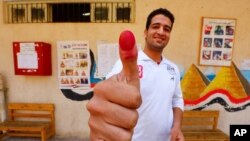Light to moderate turnout was reported on day one of a three-day constitutional referendum in which voters were expected to approve lengthening the president's term in office and strengthening his powers over the judiciary and the government bureaucracy.
Officials have promised to announce the results by April 27 and said if the constitutional amendments were approved, they would be implemented swiftly.
The amendments would deepen presidential powers and the military's presence in local communities. The presidential term would be increased from four to six years, and incumbent President Abdel-Fattah el-Sissi would be allowed to run for a third term in 2024.
Many of the amendments pertain to the government's structure, creating new positions and increasing the number of presidential appointees. The Egyptian military, which already wields tremendous economic and political power in Egypt, would also increase its role in criminal justice.
A smiling Sissi cast his ballot in the capital's Heliopolis district.
Prime Minister Mustapha Madbouli told journalists at a central Cairo polling station that voters should turn out to voice their opinions. He said he was casting his ballot as an Egyptian citizen and urged everyone else to do so as well, to show a positive spirit in what he called an important matter.
Sixty-two million Egyptians are registered to vote out of an estimated population of 100 million. Heavy security was reported at polling stations throughout Cairo. A large number of people could be seen at several polling stations in the center of the city, while turnout appeared light in outlying parts of the capital and Giza.
Gamal Noureddin Zaki, governor of Assiut province, told journalists that things were going smoothly on the first day of the referendum and he expected a fairly good turnout after all the ballots were tabulated at the end of day three.
He said he expected about half of all eligible voters in Assiut to cast ballots, and he stressed that there had been no complaints about problems with voting so far.
However, organized opposition to the referendum was almost nonexistent, with many leading public figures, businesses and media houses firmly in league with the current government.
Abdel Aziz al-Husseini, the deputy head of the opposition Tayyar al-Karama Party, told al-Hurra TV that he was not happy with the referendum because it was difficult to express opposition to the proposed constitutional changes.
He said opponents of the changes were able to express their opinions only on social media and at press conferences, and that there was no possibility of putting up posters or engaging citizens at coffee shops and universities.
Ahmed al-Khamis, a member of the Institute of Administrative Studies, told al-Hurra that the most important issue in the referendum was to maintain stability in the country.
He said it was important to show the world that Egyptians are determined to protect their country in an unstable part of the world.
Egyptian opposition TV stations based in Turkey and Qatar — which support the now-outlawed Muslim Brotherhood group — denounced the referendum, calling it "null and void." A government opponent, Ahmed Tantawi, said in a video on social media that the referendum "casts a pall on the spirit of the constitution and the [2011] revolution which gave birth to it."
Voting took place amid an unprecedented crackdown on dissidents and a rollback of freedoms that were won during the pro-democracy uprising in 2011. Human Rights Watch says over 15,000 civilians, including children, have been targeted for military prosecution over the past three years.














